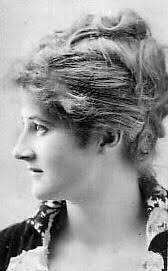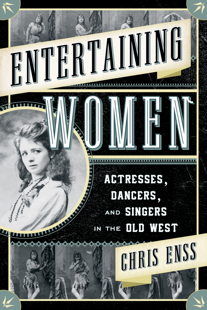Enter to win a copy of the book
Entertaining Women:
Actresses, Dancers, and Singers in the Old West

The angry hawk clenched its talons on the heavy leather gauntlet, stabbing the delicate wrist beneath. Wings bated; the half-wild bird glared fiercely into the large gray eyes of his captor. Mary Anderson stared back with steely determination. This unruly bird would be tamed, she resolved, and would become a living prop for her performance of the Countess in Sheridan Knowles’s comedy, Love. A stuffed bird would not provide the realism she intended, and what Mary Anderson intended usually came to be. Mary wrote in her memoirs:
“There is a fine hawking scene in one of the acts, which would have been spoiled by a stuffed falcon, however beautifully hooded and gyved he might have been; for to speak such words as: “How nature fashion’d him for his bold trade, /Gave him his stars of eyes to range abroad, /His wings of glorious spread to mow the air, /And breast of might to use them’ to an inanimate bird, would have been absurd.”
Always absolutely serious about her profession, Mary procured a half-wild bird and set to work on bending its spirit to her will. The training, she explained, started with taking the hawk from a cage and feeding it raw meat “hoping thus to gain his affections.” She wore heavy gloves and goggles to protect her eyes. The hawk was not easily convinced of her motives, and “painful scratches and tears were the only result.”
She was advised to keep the bird from sleeping until its spirit broke, but she refused to take that course. Persevering with the original plan, Mary continued to feed and handle the hawk until it eventually learned to sit on her shoulder while she recited her lines, then fly to her wrist as she continued; then, at the signal from her hand, the bird would flap away as she concluded with a line about a glorious, dauntless bird. The dauntless hawk and Mary Anderson were birds of a feather.
Born July 28, 1859, at a hotel in Sacramento, California, Mary’s earliest years were unsettled. Her mother, Antonia Leugers, had eloped with Charles Henry Anderson, a young Englishman intent on finding his fortune in America. It was a love match not approved by Antonia’s parents. The young couple arrived in Sacramento in time for Mary’s birth but too late to scoop up a fortune from the nearest stream. The easy pickings of the 1849 Gold Rush were gone.

To learn more about Mary Anderson and about the other talented performers of the Old West read
Entertaining Women: Actresses, Dancers, and Singers in the Old West.

